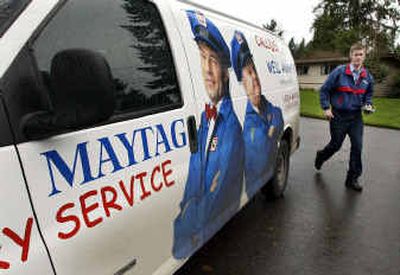They’re back in service

DES MOINES, Iowa — Former soldiers returning from Iraq or Afghanistan are finding that their military background has value at Maytag Corp., which has an aggressive recruiting program turning recently discharged soldiers into repair technicians.
“They have great discipline. They have great technical skills. They understand how to follow orders and follow procedures,” said Art Learmonth, president of Maytag Services.
Many soldiers say it was an easy transition from war machine to washing machine.
“It’s not a stressful job. It’s pretty relaxed and it’s a great big sense of accomplishment every time you do a job. I had the same feeling in the military,” said Steve Ware, 43, of San Diego, Calif., who joined Maytag after 20 years in the Navy as an aircraft technician.
Lt. Col. John Tansill, spokesman for Employer Support of the National Guard and Reserve, said Maytag, the nation’s third-largest appliance maker, is not alone in seeking out former soldiers. Sprint Corp. and The Home Depot Inc. are some of the others.
“The military likes the fact that companies are doing this,” Tansill said. “It’s telling the military we like the product that you produce.”
Paul Adams, 25, of Spokane, said he was nervous about his job prospects after four years in the Army.
“If you’re making the decision to get out of the military, no matter how long you’ve been in, it’s scary,” he said.
Adams posted a resume on the Monster.com Web site. The Maytag recruiter saw it and contacted him. Adams was offered a job and joined about 14 other men with military backgrounds in Galesburg, Ill., for the first Maytag boot camp class.
“Everybody was sort of impressed and felt fortunate to have an opportunity like that,” he said.
Maytag launched its repair business, serving all makes and models of appliances, last year.
It since has expanded into more than 50 markets representing 64 percent of U.S. households, and is expected to reach about 71 percent of households in 2005, Learmonth said.
Sears is largest single company provider of home appliance repair, followed by General Electric and Maytag. However, more than 75 percent of the market is served by independent appliance dealers and repair service operators, whose numbers are declining, Learmonth said.
“Over the last 12 years, 7,000 of these independent services have disappeared,” Learmonth said. “This group is disappearing and that is a big gap that is going to have to be filled.”
Learmonth plans to capture as much of that market for the Maytag repairman as possible.
With the rapid growth and fewer young people going into the field, demand for technicians is high, Learmonth said.
“One of the problems that we have is, as my folks say, mamas don’t raise their kids to grow up to be service technicians,” he said. “We’ve developed a solution to that problem. We hire young folks coming right out of the service. Many of them coming right back from Iraq.”
Ware, the former aircraft technician, said he heard at a job fair that Maytag was hiring former soldiers and contacted the company’s recruiter. A week later, he was offered a job and entered the company’s “boot camp” — four weeks of classroom training in appliance repair, following by four to six weeks in the field with a mentor.
He said the boot camp eases many former soldiers’ concerns because of the similarity to military training.
“They teach you a lot of stuff quickly. In the military we’re accustomed to that,” he said. “A lot of military personnel are afraid to go into the civilian sector. They’re used to doing the same thing and it’s a scary thing going into a different environment.”
He’s been in the field repairing appliances since June and said the job is what he’d hoped to find as a civilian.
“I look forward to going out to the truck to see what I’m going to be doing today,” he said.
For Adams, the customer service part of the job was overwhelming initially, but he’s become more comfortable with the personal interaction with customers.
He gets some mild ribbing from customers that he doesn’t look like Ol’ Lonely — the repairman portrayed in company advertising and on the side of the repair vans.
“People talk about it,” he said. “I’m younger. They say my picture should be on the side of the van.”
Tansill said the military’s own recruiting efforts are boosted by efforts by such companies as Maytag, Sprint Corp. and The Home Depot Co. to hire former soldiers.
“We can say, ‘Here are companies that are household words and they like the fact that you’ve gotten this training,”’ Tansill said. “In that respect it’s a nice thing to be able to tell young people.
“You come in the military, you do four or five years and when you get out there are firms out there looking for qualified people like yourselves.”